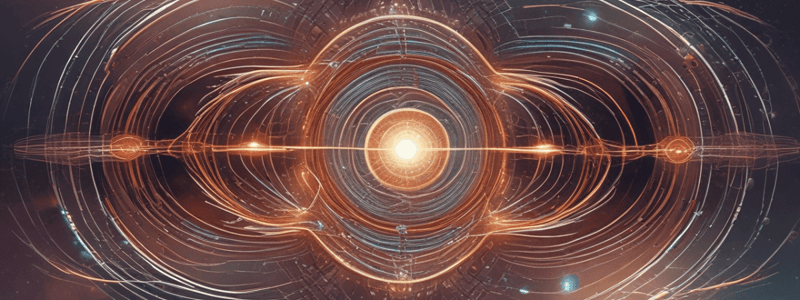Podcast
Questions and Answers
Which branch of physics studies fundamental particles like electrons and quarks?
Which branch of physics studies fundamental particles like electrons and quarks?
- Quantum Mechanics
- Particle Physics (correct)
- Relativity Studies
- Astrophysics
What is a significant challenge in physics that involves reconciling two incompatible theories?
What is a significant challenge in physics that involves reconciling two incompatible theories?
- Studying the Behavior of Stars
- Unifying Superposition and Wave-Particle Duality
- Exploring String Theory and M-theory (correct)
- Understanding General Relativity
Which theory introduces concepts like superposition and wave-particle duality?
Which theory introduces concepts like superposition and wave-particle duality?
- Astrophysics Theory
- Quantum Mechanics Theory (correct)
- Particle Physics Theory
- General Relativity Theory
Study Notes
Physics: The Science of the Universe
Physics is the branch of science that seeks to explain the natural world, focusing on the fundamental laws governing matter and energy. It is the foundation for all natural sciences, including biophysics, astronomy, and chemistry, and is closely related to engineering.
Key Concepts
Matter and Energy
Matter is anything with mass that takes up space, made up of atoms. Energy is the ability to do work and can take various forms, such as heat, light, and sound.
Motion
Motion is the change in position or displacement of an object over time. Physicists use velocity and acceleration to describe motion.
Newton's Laws of Motion
Newton's laws describe the relationship between force, mass, and motion, including the laws of inertia, acceleration, and the conservation of momentum.
Forces
Forces are interactions between matter and energy. Gravity, electromagnetic forces, and strong and weak nuclear forces are examples of fundamental forces.
Thermodynamics
Thermodynamics is the study of heat and its relation to other forms of energy. It includes concepts such as temperature, heat capacity, and the laws of thermodynamics.
Waves and Optics
Waves are disturbances that transfer energy through space, such as electromagnetic waves, sound, and mechanical waves. Optics is the study of light and its interactions with matter.
Quantum Mechanics
Quantum mechanics is the theory of the behavior of matter and energy at the atomic and subatomic scales. It introduces concepts like superposition and wave-particle duality.
Particle Physics
Particle physics is the study of the fundamental particles that make up matter, such as electrons, quarks, and photons, and the forces that act between them.
Astrophysics
Astrophysics is the study of the physical properties and behavior of astronomical objects, such as stars, galaxies, and the universe itself.
Challenges in Physics
One of the most significant challenges in physics is unifying quantum mechanics and general relativity, two seemingly incompatible theories. Researchers are exploring theories like string theory and M-theory to reconcile these disparate frameworks.
Studying That Suits You
Use AI to generate personalized quizzes and flashcards to suit your learning preferences.
Description
Explore the foundational principles of physics, including matter and energy, motion, forces, thermodynamics, waves, quantum mechanics, particle physics, and astrophysics. Learn about key theories such as Newton's laws of motion and the challenges in unifying quantum mechanics and general relativity.




